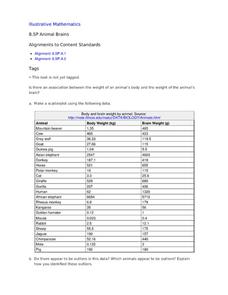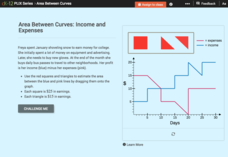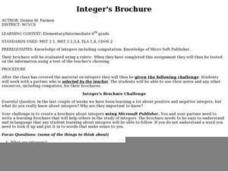Curated OER
Animal Brains
Do big bodies make big brains? Let your learners decide whether there is an association between body weight and brain weight by putting the data from different animals into a scatterplot. They can remove any outliers and then make a line...
Lehigh University
Glory (1989) - Should it be Shown in Class?
This is a fantastic activity that prompts learners to think like educators and consider the value of a historically based film beyond just the accuracy of information. Your young historians will work in groups to do a close reading and...
Curated OER
Rainy Day? P.E. Anyway!
If your PE class is faced with bad weather and must stay indoors, try one of these activities to keep them engaged and moving! Activities involve working in teams, identifying sports or parts of the body, coordination practice, and/or...
Math Mammoth
Grade 1 Worktext
Use graphing, counting, and number lines to help first graders learn about addition and subtraction. An array of worksheets and activities are an excellent resource for your math lesson, whether you are focusing on counting skills...
Curriculum Corner
It's Been a Wildly Exciting Year!
Take time at the end of the year to celebrate the amazing qualities and achievements of your learners with these printable awards. Offering a list of dozens of ways to recognize the individuals in your class, this resource is a...
Dick Blick
ArtStraw Architecture
While architects and engineers don't often build with plastic straws and foam board, the same principles still apply. Challenging both the creativity and critical thinking of students, this engaging design project is perfect...
West Contra Costa Unified School District
Arcs and Angles
Noah didn't construct this kind of arc. High school scholars first explore how angles can be formed in circles. They then learn relationships between angles and arcs by conducting an exploratory activity where they position and draw arcs...
West Contra Costa Unified School District
Shifting Linear Equations in Function Notation
Time for a shift in thinking! Learners examine translations of linear functions. They use function notation to describe the translation and make connections to the graph.
Illustrative Mathematics
Modeling London's Population
Looking at London's population from 1801–1961 in 20 year increments, high school mathematicians determine if the data can be modeled by a given logistic growth equation. They explain their thinking and determine the values of each...
Science Matters
A Model of Plate Faults
The San Andreas fault is one of the longest fault zones in the world. In a series of 20 lessons, the fourth lesson has pupils use a paper model to recreate various types of plate faults. Each is held in position then drawn...
Bully Free Systems
Bully Free Lesson Plans—Eighth Grade
Middle schoolers are likely very familiar with the concept of bullying and cliques. Discuss their experiences and brainstorm ways to handle peer conflict and feelings of exclusion with a poem that focuses on bullying, and a second lesson...
Education Development Center
Consecutive Sums
Evaluate patterns of numbers through an engaging task. Scholars work collaboratively to determine a general rule reflecting the sum of consecutive positive integers. Multiple patterns emerge as learners explore different arrangements.
CK-12 Foundation
Area Between Curves: Income and Expenses
Use the area of polygons to calculate the area between curves. Pupils calculate areas under income and expense curves by filling the space with squares and right triangles. Using that information, they determine the profit related to the...
Curated OER
Pam Wu's Teaching Portfolio
Students explore the Chinese New Year through Scholastic News magazine. In this cultural awareness lesson, students use a thinking map to develop their critical thinking skills pertaining to the Chinese New Year. Students compose...
Curated OER
Technology: Programming Graphics
Students use the DrScheme program to create graphics for clip art. Using graphics, they plan their designs using basic shapes, plotting its positions, and studying the relationships between points. By plotting the necessary data on...
Curated OER
Integer's Brochure
Sixth graders investigate integers. In pairs, they create and publish a brochure that presents information about positive and negative integers, includes hand-drawn illustrations, and integer-related graphics.
Curated OER
Describing Environments
Fifth graders describe environments using position words. For this description lesson, 5th graders practice using adjective, comparatives and superlatives in partners and on worksheets.
Curated OER
Zero is Our Hero (Grades 6-9)
Students become interactive participants in introductory and practice activities involving positive and negative numbers. After watching a video, students play games together which help them use positive and negative numbers effectively.
Curated OER
Incredible Encouragers
Learners observe and demonstrate how to use and give positive encouragement to their teammates and opponents. They read and discuss a list of positive sayings, then during a P.E. game, students earn Incredible Encourager stars when they...
Curated OER
What Does My Bacteria Look Like?
Students identify Gram positive and Gram negative bacteria using staining techniques. Students research importance of identification of bacterial types in diagnosing bacterial diseases.
Curated OER
Character Traits Introductory Lesson
Young scholars identify character traits. In this reading comprehension lesson, students read the story of Dr. Jekyll and Mr. Hyde and discuss the characters. Young scholars identify positive and negative character traits from the story.
Curated OER
A Look At Me
Ninth graders discover how to begin thinking positively about their futures. For this planning lesson students complete several activities for planning their lifelines.
Curated OER
Fraggle Monster Vase
Students create an optical illusion. For this optical illusions lesson, students sketch a monster's face to create the optical illusion of a vase in the positive space. Students create an original piece of art.
Curated OER
Landfill
Young scholars go to a landfill and respond to questions about what the negative and positive aspects of a landfill are. In this landfill lesson plan, students write their own questions to ask the tour guide and answer questions...























